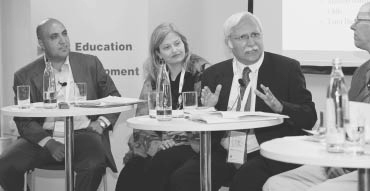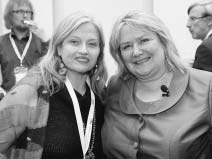Marcela Ballara
No Strategy is Complete without a Gender Approach
In the panel discussion on the Education Strategy of the German Ministry for Economic cooperation and Development (BMZ) which took place on 11 May in Berlin in conjunction with the XIII German Adult Education Conference (Volkshochschultag), Marcela Ballara was representing the Latin American women’s education network (Red de Educación Popular entre Mujeres REPEM), as well as the International Council for Adult Education. She has vast experience from the coordination of ICAEs gender education office GEO which arose from the women’s programme organised soon after the Council started off. The creation of GEO was a deepening of that programme taking into account that three important feminist networks took part in its foundation: REPEM, the African Women’s Development and Communication Network (FEMNET) and Development Alternatives with Women for a New Era (DAWN)-Southeast Asia. GEO´s mission is to mainstream gender in the Adult Education sector, to ensure that women are granted the right to Lifelong Learning and to participation as active citizens. Monitoring and follow up of international agreements on gender, education and lifelong learning, and mainstreaming gender in different global and regional spaces such as UNESCO, World Social Forum, World Education Forum, UN Conferences, and global campaigns count among the tasks that Marcela Ballara has pursued on GEO’s behalf.
Her reaction to the presentation of the Education Strategy of the German Ministry for Economic cooperation and Development (BMZ) was to point out that, despite its generally laudable intentions, the document “had no gender analysis nor gender approach”. From her experience of monitoring policy statements and agreements, this is a crucial point. It is not sufficient that gender equality, access of girls to learning, and improving the position of girls and women in society are implicitly aimed at. These aims should be spelled out in detail to make them evident and to allow holding governments accountable for their implementation.
Ms Ballara also missed closer attention to Adult Education and informal learning. She feels that the concept of Lifelong Learning which characterizes the strategy document should be more specific when it comes to the needs of adults. She made the case by describing the need for adult learning with a gender perspective as seen from the Latin American context, which surely is similar to that of the other regions where BMZ pledges its commitment to fostering education. Her analysis and her conclusions point at many aspects which should be specifically taken up by the strategy paper. She holds that only objectives and plans which are clearly stated by name will be incorporated in action plans, budgeted and implemented and may lead to results.
We include the presentation which she prepared for the panel discussion on the education strategy of the BMZ which took place on 11 May in Berlin, and from which she drew in the discussion.
Gender and Adult Education: the Current Challenges in Latin America
After the transcendental Women’s conference in Beijing in 1995, the international community made a compromise to achieve gender equality in education. Five years later, the World Declaration of Education for All (EFA) and the Millennium Development Goals (MDGs) reaffirmed that education is a fundamental human right. The countries recognized that girls’ education is the first important and necessary stage for the attainment of this goal. Gender parity in primary and secondary education was included as part of the EFA goals and the Millennium Development Goals to achieve girls school enrolments equivalent to boys enrolment
The Situation of Women’s Education in Latin America
According to recent UNESCO data, in 2008 more than half the countries in the region (22 of 36) succeeded to achieve gender parity in primary education. At secondary level some countries have achieved parity. For tertiary education, we see a gradual admission of women to higher education establishments.
Education levels in Latin America are polarized, and there are groups that still have high levels of illiteracy, along with other social groups that have significantly increased their level of education in recent decades. There are large discrepancies, especially when the differences between poor and not-poor are measured. This situation constitutes a serious problem in relation to economic development, and is a sign of social injustice.
This is reflected especially in the rural sector, which directly affects the access of rural women to employment.

Discussion about the education strategy of the BMZ
Source: Heidi Scherm
From a very broad analysis, the Latin American Network for Women’s Education REPEM considers that the main constraints of Adult Education and gender in Latin America are:
- Most governments do not consider non-formal Adult Education, or Lifelong Learning in the education programs of their countries. This is a concept that is not often included when planning Adult Education. More emphasis is put on out of school education or continuing education oriented towards tertiary education. In this frame, and due to the urgent educational needs of women, civil society organizations (CSO) are the main providers that implement youth and Adult Education activities addressed to women and young girls, as is the case of REPEM, but very often they lack the necessary financial support to broaden their activities to address the practical and strategic needs of women.
- Adult Education activities addressed to women usually do not take the needs of rural, indigenous, afro-descendant and urban women into consideration. The scarce Adult Education activities that are planned and implemented tend to maintain the reproductive roles of women offering very traditional training such as cooking, “nutrition”, knitting, or family care. Seldom do they address strategic needs of women. Women are agents of change. Therefore Adult Education with a gender perspective must support women’s empowerment, enhance their citizenship and include activities that ease their access to nontraditional employment and develop entrepreneurship skills that pave the way towards their economic autonomy.
- One constant problem is the lack of Adult Education training for the indigenous and afro-descendent population, and in the cases where it is available, often the educational content does not meet their needs. Frequently, this is due to language constraints since these programs do not always consider the mother tongue of the women.
- Illiteracy is a constant concern in the region, and although the adult literacy rates for women reach 90 %, and even 92 % in the case of men, illiteracy still persists in rural areas, especially in areas with a large representation of indigenous population. Few literacy courses are organized that consider the mother tongue of indigenous women and that follow their needs.
- In general, governments and donors seldom support research on Adult Education and gender issues that contribute to an inclusive, non-discriminatory education for democracy, for peace, and for human rights.
But one of the main problems that women face to participate in Adult Education activities is their time constraints. Their reproductive, productive and community roles prohibit them from active enrolment in Adult Education activities, especially if they are implemented during the hours that they perform their main roles. Women are overloaded with work, and if Adult Education activities are to be successfully attended by women and make a change in their lives, these activities must be offered during the time when they are available and include schemes to alleviate the work of women, e.g. through child care during their training activities.
Challenges
Adult Education with a gender perspective in the Latin American region faces several challenges that must be considered:
- The contents must contribute to economic autonomy of women, to cultural transformation, and to the advancement of peace, human rights, and social justice. Most Adult Educational curricula do not cover these issues, they tend to be very traditional and, as referred to before, they often concentrate on the reproductive roles women.
- The contents and actions must be linked to new societal challenges: climate change, AIDS, urban and domestic violence, citizenship, democracy, on the job training. Women need to be urgently provided with the necessary skills to meet the requirements of the current labour market.
- Improving social and human capital in rural and peri-urban areas is key to better job alternatives and decent work. It is urgent that governments and donors invest in quality Adult Education and develop Lifelong Learning programs to help poor urban and rural women to exercise their citizenship, be agents of change and contribute to sustainable development.

Marcela Ballara, Karin Jahr de Guerrero
Source: Heidi Scherm


